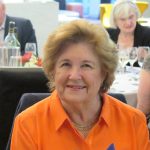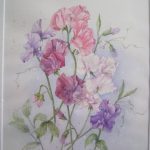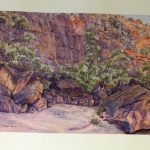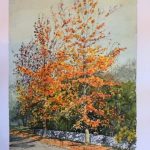 This is the second of three articles about MWC members who are active in an artistic field other than music. This week I am delighted to feature Helen Reid, who joined the sopranos a few years ago, having previously sung with the Newcastle University Choir.
This is the second of three articles about MWC members who are active in an artistic field other than music. This week I am delighted to feature Helen Reid, who joined the sopranos a few years ago, having previously sung with the Newcastle University Choir.
Helen’s other artistic love is painting in water colours. When you see examples of her work, it is hard to believe that she started painting only seven years ago. She initially sampled a variety of media, assessing their pros and cons, eventually settling on the most difficult, water colours. She now paints with Guy Troughton, a prominent member of the Watercolour Institute of Australia who lives and exhibits locally.
Helen writes that the nature of water colour makes it very difficult to master and predict . “The result varies with the thickness and quality of the underlying paper and the air temperature, which means quick or slow drying of adjoining areas of paint. The difference in grain size of the pigments for different colours means that, in water, each colour runs and flows at different rates, often giving unexpected results. Some colours push others aside quite rudely; some are soft, gentle, retreating. Tiny variations in the amount of water can mean sharp edges to objects or quite unpredictable flows and runs on colour into one another. As well as being a constant challenge, the medium is a constant delight as you explore its qualities and infinite variation.”
. “The result varies with the thickness and quality of the underlying paper and the air temperature, which means quick or slow drying of adjoining areas of paint. The difference in grain size of the pigments for different colours means that, in water, each colour runs and flows at different rates, often giving unexpected results. Some colours push others aside quite rudely; some are soft, gentle, retreating. Tiny variations in the amount of water can mean sharp edges to objects or quite unpredictable flows and runs on colour into one another. As well as being a constant challenge, the medium is a constant delight as you explore its qualities and infinite variation.”
 Helen most enjoys painting subjects which have some personal meaning for her. Examples which she has kindly agreed to be included in this article are flowers from a friend’s garden, a gulley near Alice Springs she once visited and a tree across the road from her home. She says that inspiration comes from feeling a connection with the subject, something these pictures bear out. It goes without saying that the photographs do not do anything like full justice to the actual paintings.
Helen most enjoys painting subjects which have some personal meaning for her. Examples which she has kindly agreed to be included in this article are flowers from a friend’s garden, a gulley near Alice Springs she once visited and a tree across the road from her home. She says that inspiration comes from feeling a connection with the subject, something these pictures bear out. It goes without saying that the photographs do not do anything like full justice to the actual paintings.
 What next? An exhibition perhaps? Helen is not that keen on botanical or zoological subjects (Guy Troughton’s speciality) but would like to tackle the challenge of portaiture. It will be interesting to see the results!
What next? An exhibition perhaps? Helen is not that keen on botanical or zoological subjects (Guy Troughton’s speciality) but would like to tackle the challenge of portaiture. It will be interesting to see the results!